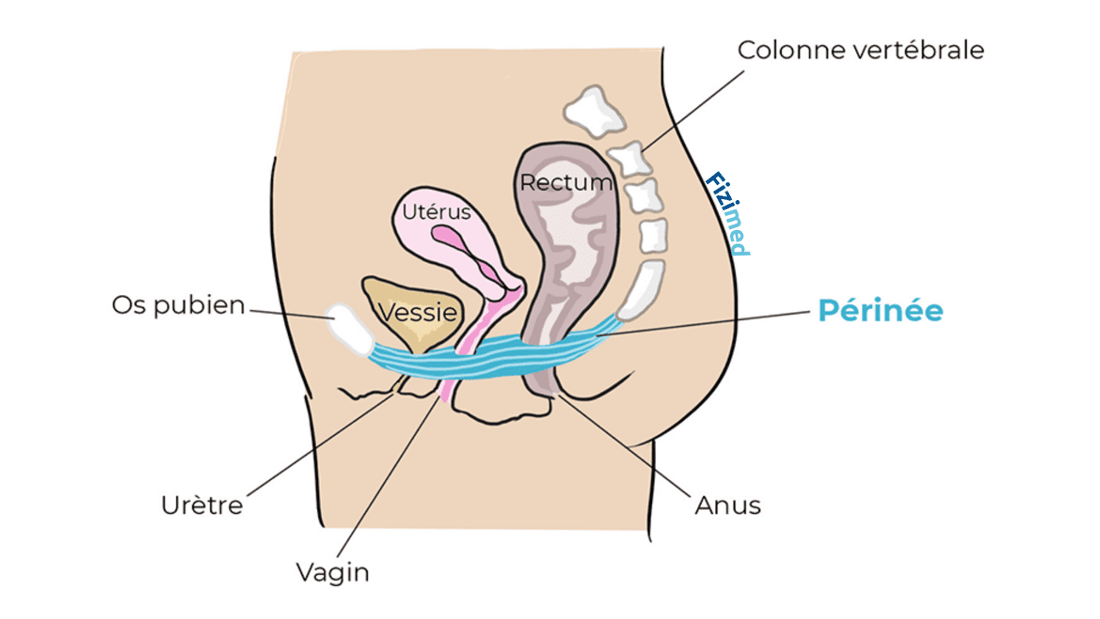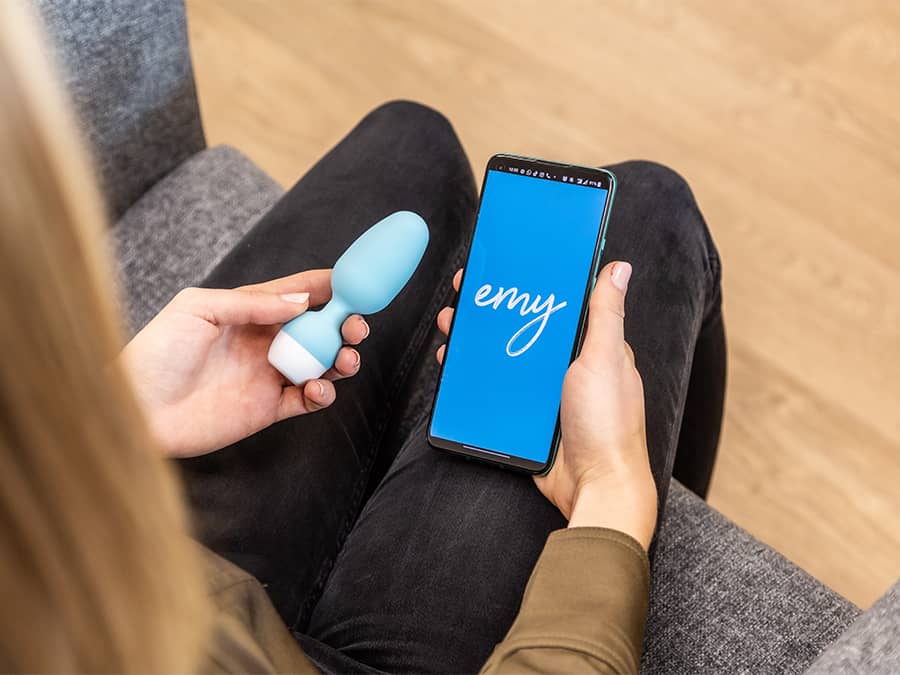Périnée : tout ce qu’on ne vous dit pas
C’est quoi le périnée ?
Le périnée est un peu comme le deuxième cœur de notre corps. Si il n’est pas en “bonne santé” c’est tout notre corps, notre quotidien et surtout notre santé qui le ressentent. Aussi appelé plancher pelvien, il est composé d’un ensemble de muscles et de ligaments qui s’étendent du pubis au coccyx.
Souvent comparé à un hamac à cause de sa forme, il remplit en réalité la même fonction qu’un trampoline : il accompagne, à chaque mouvement, les organes du petit bassin comme la vessie, l’utérus, le rectum… et les maintient. C’est généralement (et malheureusement) seulement au cours d’une grossesse que les femmes en entendent parler pour la première fois.

Et... À quoi ça sert le périnée ?
Vous l’aurez compris, la fonction principale du périnée est de maintenir vos organes génitaux. Il est également l’un des acteurs principaux du bon déroulement de votre passage aux toilettes. Et oui, lors de la miction certains muscles du périnée se relâchent pour laisser passer l’urine et il se contractent à nouveau lorsque vous avez fini. C’est le même principe pour les selles. Mais ce n’est pas tout, si votre périnée vous permet d’éviter des problèmes de santé tels qu’une descente d’organes ou de l’incontinence par exemple, il vous aide également à améliorer votre quotidien !
Vous ne le saviez peut être pas mais le périnée est l’un des muscles de l’amour, si il est tonique vous pouvez avoir une sexualité plus épanouie.
Mais, pour qu‘il puisse continuer à remplir correctement toutes ses fonctions, il faut en prendre soin et le garder tonique tout au long de votre vie.
Comment savoir si mon périnée est en bonne santé ?
Vous ne savez pas si votre périnée à besoin d’être tonifié ? Écoutez votre corps ! Lorsque votre périnée se relâche, cela peut engendrer plusieurs signaux d’alerte.
Voici les symptômes qui peuvent vous mettre la puce à l’oreille :
• Vous avez des fuites urinaires (et oui, quelques gouttes ça compte aussi)
• Vous ressentez des douleurs ou un manque de sensation pendant vos rapports sexuels
• Vous êtes dans l’urgence lorsque vous avez envie d’aller aux toilettes et vous n’arrivez pas à vous retenir
• Vous ressentez une pesanteur vaginale (c’est d’ailleurs l’un des premiers signes pouvant évoquer une descente d’organes)
Vous vous reconnaissez ? Alors n’attendez plus et allez consulter un professionnel de santé qui pourra vous aider à poser le diagnostic et vous prendre en charge.
En plus de ces symptômes, il faut savoir que de nombreux facteurs influent sur la tonicité du périnée. Mais comme le périnée est un ensemble de muscles “invisible”, c’est l’une des raisons pour lesquelles les femmes en ont si peu conscience. L’un des facteurs de risque le plus connu et le plus impactant sur le périnée reste la grossesse.
Les effets de la grossesse sur le périnée
Pendant 9 mois le poids du bébé va venir créer une pression de plus en plus importante sur le périnée et la vessie. Pour celles qui ont déjà été enceintes, vous devez sûrement vous souvenir de cette envie très forte et très urgente d’aller aux toilettes, peu importe la quantité de boisson que vous aviez consommée. Sans parler des gouttes qui viennent s'immiscer dans votre culotte et qui font peut-être désormais partie de votre quotidien.
Qu’il s’agisse d’un accouchement par césarienne ou par voie basse, le corps d’une femme enceinte sécréte des hormones et notamment de la relaxine. Cette hormone va agir sur les articulations et les ligaments pour détendre et assouplir les tissus afin de préparer le corps à l’accouchement. C’est donc tout naturellement que les muscles du plancher pelvien vont se relâcher à partir du moment où vous allez tomber enceinte.
Au moment de l’accouchement, le passage du bébé peut également fragiliser le périnée. Pour sortir la tête du bébé plus facilement lors des poussées vous pouvez être confronté à une épisiotomie. Il s’agit d’une incision d’environ 2,5 cm à 5 cm de long qui est pratiquée dans le bas du vagin pour augmenter l’ouverture et faciliter le passage du bébé. On rappelle tout de même que l'épisiotomie, c’est comme les antibiotiques, c’est pas automatique ! Cette pratique ne doit donc pas être systématique et ne devrait concerner que 10% des accouchements.
Le médecin Martin Winkler se veut rassurant :
“les déchirures spontanées sont souvent plus réduites et plus superficielles que les épisiotomies. Elles sont plus faciles à réparer et guérissent plus rapidement…”
Pour limiter les risques, à partir du 8ème mois de grossesse, vous pouvez, à l’aide d’une huile neutre ou d’une huile spéciale massage du périnée, masser votre périnée pour “l’assouplir” et prévenir une éventuelle déchirure.
Comment prendre soin de son périnée ?
Pas de panique, si votre périnée est en détresse, il existe de nombreuses méthodes pour prendre soin de votre périnée à chaque étape de votre vie. Mais la méthode la plus efficace est sans surprise de tonifier son périnée régulièrement tout au long de sa vie. Un peu comme les abdos. On ne fait pas juste 10 séances puis on s’arrête, sinon, bye bye les effets de la musculation. C’est exactement pareil pour le périnée, c’est un ensemble de muscle qu’il faut chouchouter tout au long de sa vie, pas uniquement après un accouchement.
👉🏼 La rééducation périnéale en post-partum
Le périnée se tonifie par prévention et se rééduque par obligation et cela quoi qu’il arrive après une grossesse. Et oui, peu importe votre façon d’accoucher, le périnée est très sollicité pendant une grossesse, même en cas de césarienne. Mais avant de commencer sa rééducation du périnée, on laisse le temps à notre corps de récupérer.
On attend 6 à 8 semaines post-partum avant de commencer ses séances de rééducation. Vous pouvez ensuite consulter votre sage femme ou un kinésithérapeute pour faire un premier bilan et commencer à rééduquer votre périnée. L’objectif des séances : renforcer votre périnée pour qu’il retrouve sa tonicité et que vous puissiez dire au revoir aux fuites et bonjour à une sexualité épanouie !
Il existe différentes méthodes de rééducation qui sont adaptées aux besoins de chacune.
On y retrouve :
• L'électrostimulation : ce sont des courants électriques qui vont venir faire réagir et stimuler votre périnée. Vous êtes passive, ce sont les stimulations électriques qui sollicitent votre périnée.
• Le biofeedback : vous êtes active, vous prenez conscience de votre périnée en le contractant et en le relâchant vous-même. Vous avez un retour en temps réel de vos contractions directementsur un écran. Cela vous permet de suivre et d’adapter l’intensité de vos contractionsà l’exercice demandé.
👉🏼 Continuer sa rééducation du périnée à la maison
Pour cela, il existe la sonde périnéale Emy, développée par la start-up Fizimed. C’est un dispositif médical cliniquement prouvé qui vous permet de rééduquer votre périnée à domicile. Vous pouvez vous entraîner où vous voulez, quand vous le souhaitez et à votre rythme ! Un gain de temps pour que vous puissiez profiter pleinement de votre bébé et éviter de vous déplacer.
La solution Emy est composée d’une sonde vaginale couplée à une application mobile vous permettant de visualiser vos contractions grâce à des jeux médicaux, comme ceux utilisés chez les professionnels de santé. C’est une solution innovante et française qui révolutionne la rééducation du périnée à domicile.
La solution Emy a été pensée pour que la rééducation du périnée ne soit plus une corvée mais un moment ludique, amusant, motivant et surtout, facile d’utilisation. Et parce que notre santé n’est pas un jeu, Fizimed a également réalisé un essai clinique qui a prouvé l’efficacité de la sonde Emy. Les premiers effets sur le périnée apparaissent dès 3 semaines d'utilisation seulement : meilleure tonicité, diminution des fuites urinaires, amélioration des sensations pendant les rapports sexuels… Testez par vous-même !


© Fizimed
Pourquoi faut-il prendre soin de son périnée ?
Au cours de la vie d’une femme, il n’y a pas que la grossesse et l’accouchement qui vont affaiblir et malmener le périnée. De nombreux facteurs y jouent un rôle et finissent par impacter directement ou indirectement, les muscles pelviens.
On retrouve par exemple :
• l’âge : les tissus se relâchent naturellement avec le temps et la chute hormonale
• la pratique sportive : et surtout les sports à forts impacts ou avec des à-coups
• le port de charges lourdes : il augmente la pression abdominale et peut malmener le périnée
• le surpoids : la pression excessive qui s’exerce sur le périnée peut l’affaiblir
• la constipation : les poussées répétées peuvent induire un relâchement du périnée
• le tabac : la toux chronique chez les fumeurs sur-sollicite le périnée
Alors qu’importe votre âge, vous pouvez être confrontée à des problèmes de périnée. C’est un ensemble de muscles, au même titre que n’importe quel autre muscle de notre corps, dont il faut prendre soin tout au long de sa vie de femme !
Vous souhaitez obtenir plus d’informations ou de ressources sur le sujet ?
Nous conseillons les comptes Instagram suivants :
@princessepérinée
@périnée_bienaimé
Article rédigé en collaboration avec Fizimed.











